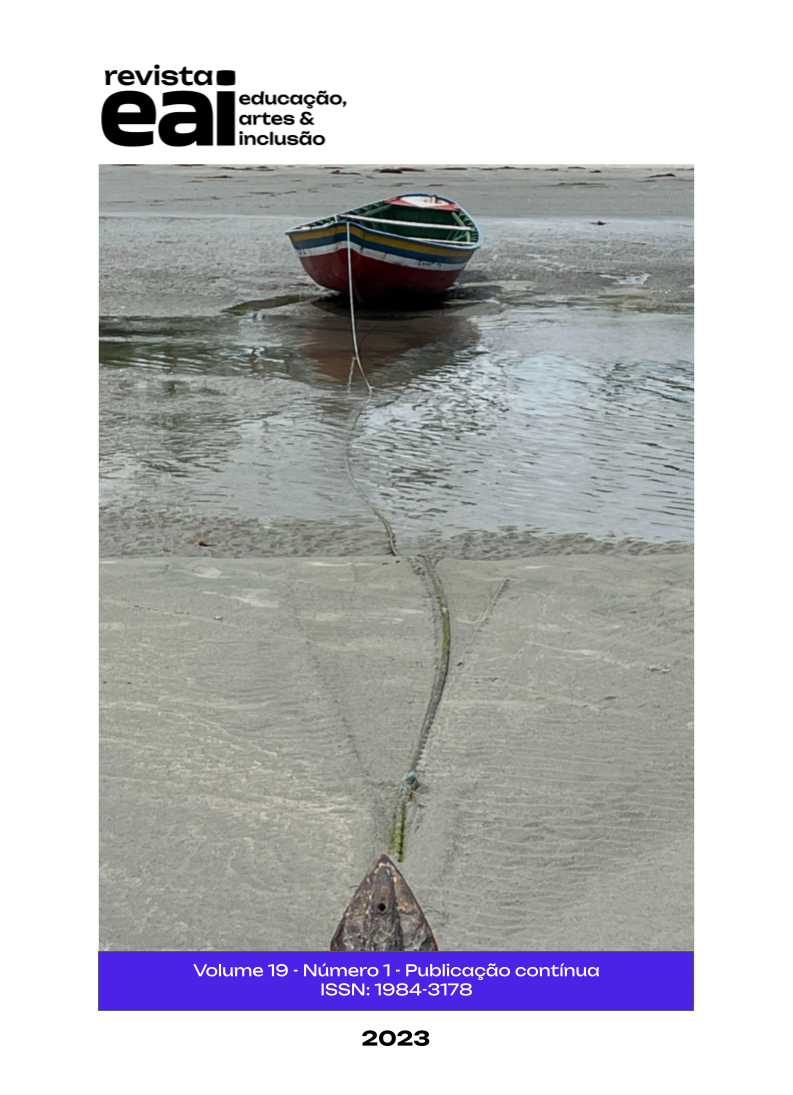The Theoretical-Methodological Unit Of The Theater Of The Opressed Augusto Boal
DOI:
https://doi.org/10.5965/198431781820231e0038Keywords:
Augusto Boal, theater of the oppressed, theoretical-methodological unit, human formationAbstract
The purpose of this article was to analyze the method of the Theater of the Oppressed by Augusto Boal (1931-2009), trying to explain its theoretical-methodological unity from the perspective of human formation. We take as the main source of analysis, the book Games for Actors and Non-Actors (2008), where the theatrologist bases his method on examples of Forum Theater systematized, in the period of political exile lived in Europe, in the mid-1970s. We present Boal's interpretation of the categories "spectator" and "spect-actor" explaining who are the protagonists of the Theater of the Oppressed proposal. From the analysis of Boal's plays on the construction of atomic power plants, land reform and feminism, we highlight the pedagogical dimensions of his method in establishing relationships with classical approaches of the theater. We show that the content and methodology of the Theater of the Oppressed combine in the perspective of individual and social transformation of spectators into spect-actors. We conclude that about the pedagogical importance of theater in the formative process in that, by explaining situations of oppression among individuals, it promotes the development of human potentialities and consequently favors conditions of overcoming boundaries and conflicts.
Downloads
References
ARISTÓTELES. A Poética. In: Os Pensadores. Volume 1. Rio de Janeiro: Abril S/A Cultural e Indústria, 1973.
BOAL, A. Teatro do Oprimido e Outras Poéticas Políticas. 1. ed. São Paulo: Cosac Naify, 2013.
BOAL, A. Jogos para atores e não-atores. 12. ed. Rio de Janeiro: Civilização
Brasileira, 2008.
CRUZ, P. P. A Centralidade do Diálogo na Dimensão Pedagógica do Teatro do Oprimido: Entre a Maiêutica Socrática e a Pedagogia do Oprimido. Dissertação (Mestre em Educação) – PUC. Rio de Janeiro, 2011.
FISCHER, E. A Necessidade da Arte. 9. ed. Rio de Janeiro: Guanabara Koogan, 2002.
KONDER. L. Os Marxistas e a Arte. 2. ed. São Paulo: Expressão Popular, 2013.
NUNES, A.L.R. Trabalho, Arte e Educação: Formação Humana e Prática Pedagógica. 1. ed. Santa Maria: Editora da UFSM, 2003.
NUNES, B. Introdução à Filosofia da Arte. 6. ed. São Paulo: Ática, 2008.
RANCIÈRE, J. O espectador emancipado. 1.ed. São Paulo: Martins Fontes, 2012.
SANTOS, B. A Arte do Coringar. 2010. Disponível em: http://kuringa-barbarasantos.blogspot.com/2010/08/arte-de-coringar.html. Acesso em: 10 abr. 2019.
SAVIANI, D. Interlocuções pedagógicas: conversa com Paulo Freire e Adriano Nogueira e 30 entrevistas sobre educação. 1.ed. Campinas: Autores Associados, 2010.
TEIXEIRA. T. M. T Dimensões Sócio Educativas do Teatro do Oprimido: Paulo Freire e Augusto Boal. Tese (Doutorado em Educação e Sociedade). Universidade Autónoma de Barcelona. Barcelona, 2007.
VIVEIROS, E. O Inimigo Do Povo. In: Peça Tuca. 2007. Disponível em: https://onedrive.live.com/?authkey=%21AJ6WevzN%5Flgs2NA&cid=ED63EA30E2515AC6&id=ED63EA30E2515AC6%21854&parId=ED63EA30E2515AC6%21373&o=OneUp . Acesso em: 02 jun. 2019.
Downloads
Published
How to Cite
Issue
Section
License
Copyright (c) 2023 Carolina Marcon Portes, MARIA Inalva Galter

This work is licensed under a Creative Commons Attribution-NonCommercial-ShareAlike 4.0 International License.
Copyright Statement
The Educação, Artes e Inclusão is a journal that follows the Free Access Policy. The articles published by the journal are free of charge, intended for educational and non-commercial applications. The articles whose authors are identified represent the expression from the point of view of their authors and not the official position of the Educação, Artes e Inclusão Journal or the Educação, Artes e Inclusão Research Group.
Authors who publish in this journal agree to the following terms:
(A) Authors retain the copyright and grant the journal the right of first publication, with the work simultaneously licensed under the Creative Commons Attribution License which allows the sharing of the work with acknowledgment of authorship and initial publication in this magazine.
(B) Authors are authorized to take additional contracts separately, for non-exclusive distribution of the version of the work published in this journal (eg publish in institutional repository or as a book chapter), with acknowledgment of authorship and initial publication in this magazine.
(C) This journal provides public access to all of its content, as this allows for greater visibility and scope of published articles and reviews. For more information on this approach, visit the Public Knowledge Project.
This journal is licensed under a Creative Commons Attribution-NonCommercial-ShareAlike 4.0 International License. This license allows others to remix, adapt and create from your work for non-commercial purposes, and although new work must give you due credit and cannot be used for business purposes, users do not have to license such derivative works under the same terms.



